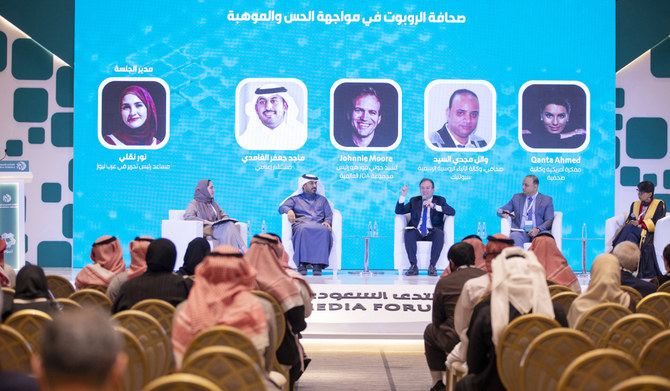RIYADH: The second Saudi Media Forum, which was held in Riyadh on Monday and Tuesday, discussed the role of digital transformation in developing artificial intelligence systems and explored challenges being faced by the media industry.
The two-day forum hosted a number of workshops and sessions led by industry professionals.
One session, titled “Robot journalism in the face of senses and talents,” was moderated by Noor Nugali, assistant editor in chief of Arab News.
The session discussed the future of AI, recent developments in the field and the impact of robot journalism.
During the panel discussion, British American physician and journalist Qanta Ahmed said: “I would encourage your leaders to actually begin acquiring the AI … technologies from the outset. Bill Gates just invested $10 billion in ChatGPT.”
Ahmed says that Saudi Arabia should likewise look into investing in AI.
We are living in an exciting time, and we should not be technology skeptics, but as with any new technology there could be unintended consequences that must be considered along the way.
Johnnie Moore, President, Congress of Christian Leaders and JDA Worldwide
“Unless Saudi Arabia embraces AI from the outset … we are going to see an expanded bias that we already see in English-language media, which … (often) promotes ancient stereotypes that are actually not true,” she said.
She explained how AI systems gain information from data that is given to them and how that might affect how the Kingdom is viewed.
“Computers have neural networks that learn only from the data that is fed to them. You are going to see an exaggeration of sentiment that is not in favor of this nation,” said Ahmed.
Johnnie Moore, president of the Congress of Christian Leaders and of JDA Worldwide, also spoke in the panel discussion.
In an interview with Arab News, Moore elaborated on his perspective on the future of AI.
“AI can vastly improve our lives — in a truly transformative way — unless it is misused,” he said.
Moore says that AI has a long way to go in order to replace humans.
“As for technology, AI cannot replace humans and won’t be able to replace humans in our lifetime. The human brain is like a quantum computer inside a quantum computer, and it’s incredibly efficient. It just needs a little food and water, and it runs. Technology is accelerating, but it cannot replace us. AI has too far to go.
“We are living in an exciting time, and we should not be technology skeptics, but as with any new technology there could be unintended consequences that must be considered along the way,” he said.
Prior to attending SMF, Moore said he has visited the Kingdom numerous times and that so much of his life intersects with Saudi Arabia since he grew up visiting his father, who previously worked here.
“I’ve been coming to the Kingdom a lot … I just can’t keep up with the pace of change ... the most exciting thing is talking to young Saudis because it’s people who studied all around the world, who’ve lived all around the world, who are choosing to invest in the future here because of what’s happening in this place.
“I’m betting on Saudi Arabia and betting on the future of this region,” Moore said.
















